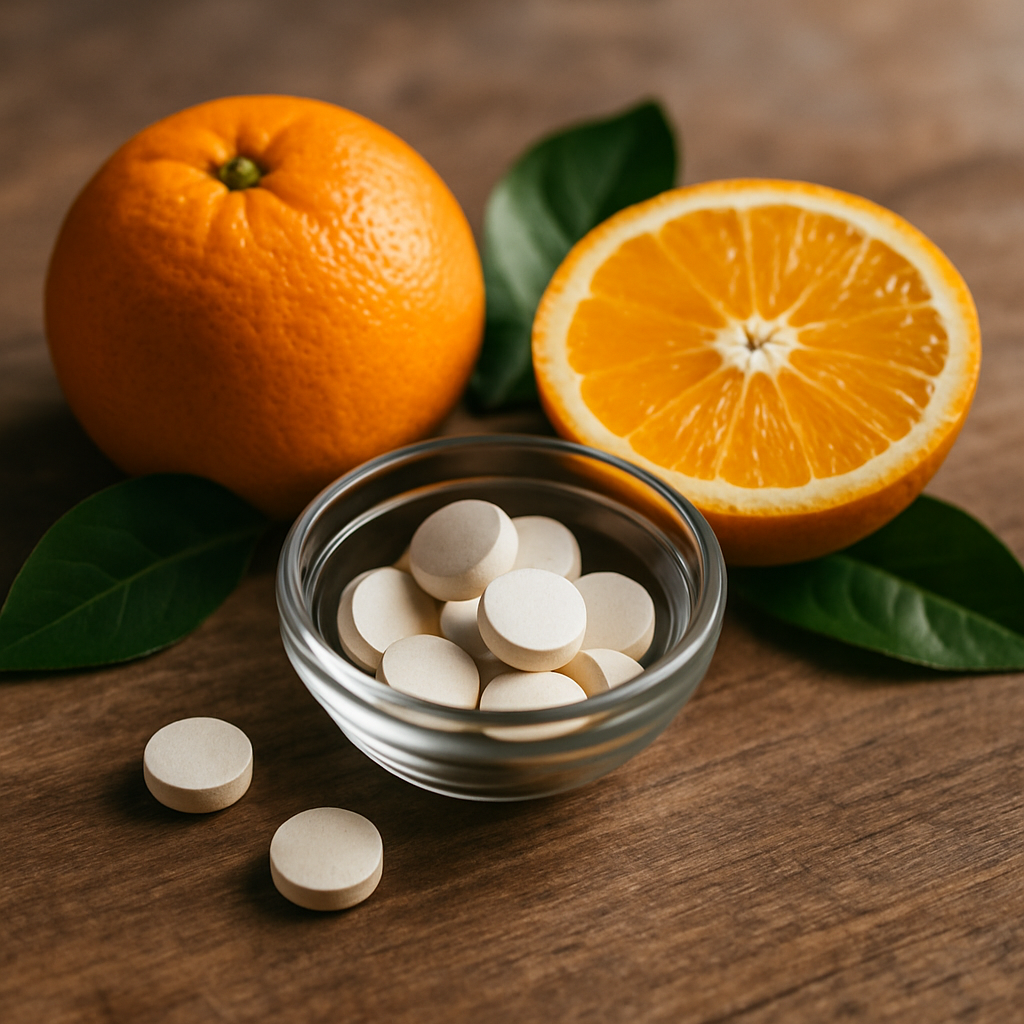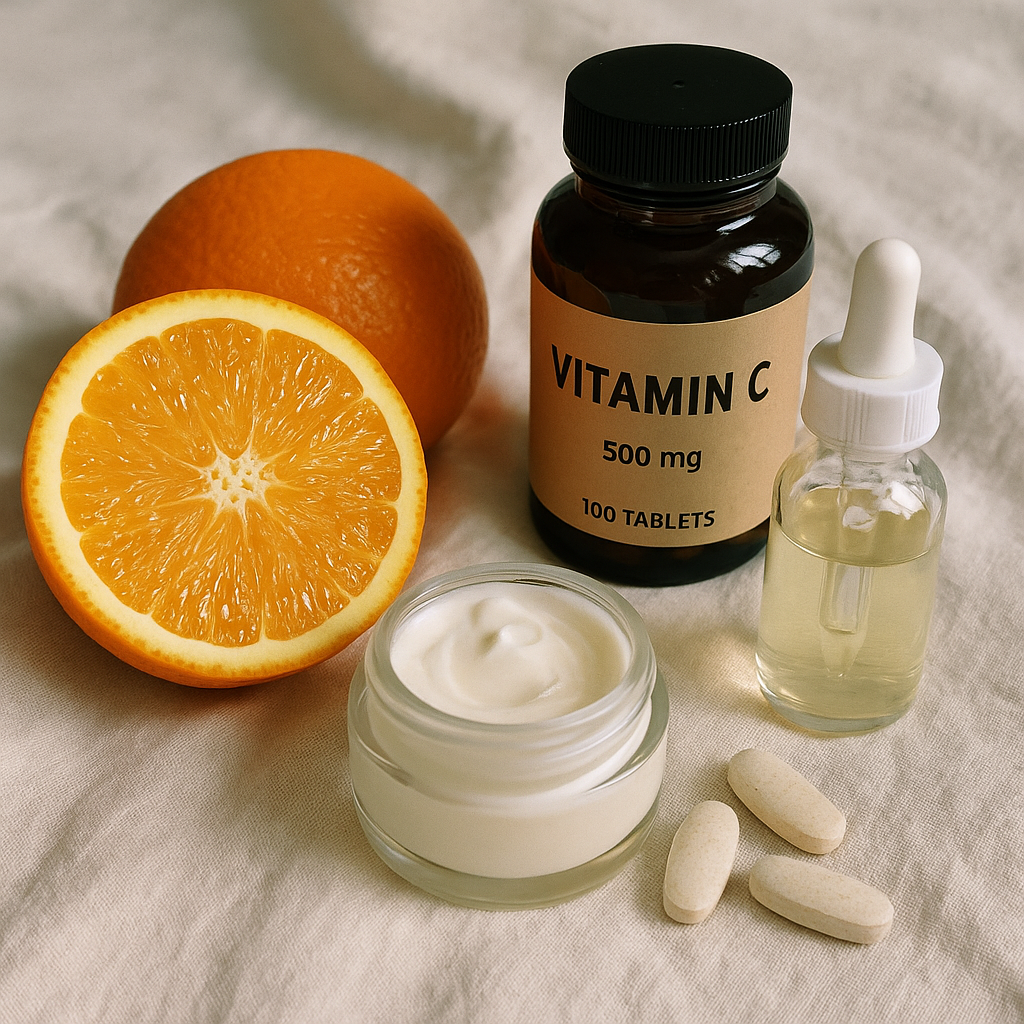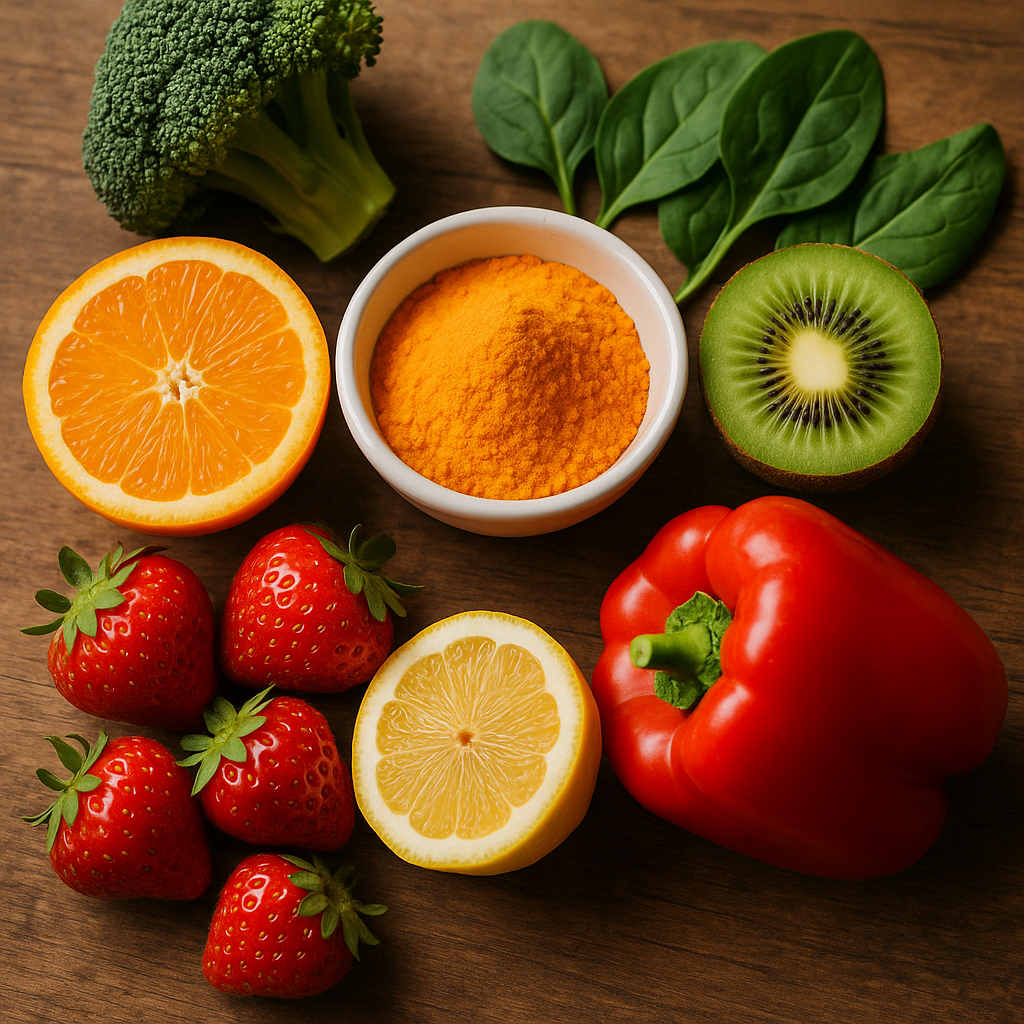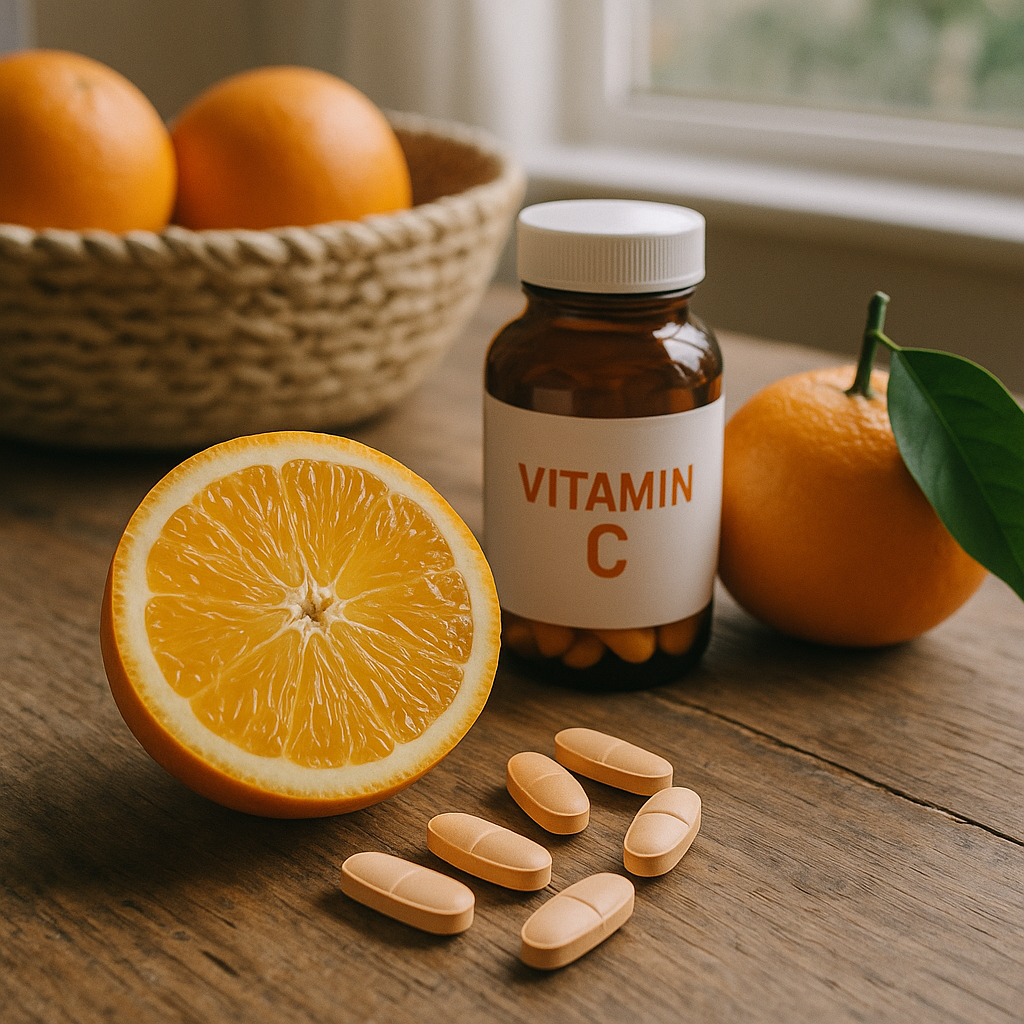What Does Vitamin C Do? Ayurvedic Benefits, Foods, and Deficiency

So, what does vitamin C do, really? That tiny, sour-tasting nutrient — the one we associate with oranges and cold remedies — turns out to have a wild resume. And no, it's not just for when you’re sneezing nonstop or chasing “glowy skin” on TikTok. Vitamin C, or as the science-y folks say, ascorbic acid, is one of the most quietly powerful players in the body’s entire operation. It affects everything from how you digest food to how vibrant your face looks in the morning. Seriously.
But wait, what is vitamin C for? Why does everyone go on about it like it’s the holy grail of health? Is it only about boosting immunity, or is that just marketing fluff? And what happens if you don’t get enough? (Hint: it’s not pretty — we’re talking weak immunity, weird skin stuff, and constant fatigue.)
In this article, we’ll break it down — Ayurvedic-style. We’ll cover the vitamin C benefits you actually care about, the best vitamin C foods, how to tell if you're not getting enough, and how ancient traditions like Ayurveda view and use this incredible nutrient. We'll also dive into the real deal on vitamin C for skin, dark spots, and why your grandma may have been onto something with all those citrusy home remedies.
Let’s dive in — and no, you don’t need a degree in nutrition or Sanskrit to follow along.

What Is Vitamin C
Natural Role of Vitamin C in Tissue Rejuvenation (Rasayana)
First things first — what is vitamin C? It’s a water-soluble vitamin, meaning your body doesn’t store it. That also means you’ve got to get it from outside sources, usually daily. Technically, it's a potent antioxidant. In Ayurvedic terms, it's very much aligned with the idea of Rasayana — that concept of deep nourishment, renewal, and longevity. Rasayanas are rejuvenators. They restore, protect, and rebuild. Sound familiar?
Vitamin C works in pretty much the same way — it helps tissues heal, boosts collagen synthesis (hello, skin elasticity), and shields cells from oxidative stress. It’s kind of like your body’s maintenance crew. Silent but crucial.
Connection Between Vitamin C, Agni (Digestion), and Ojas (Vitality)
Okay, here’s where it gets really interesting. Ayurveda speaks of Agni, your digestive fire, and Ojas, that subtle essence responsible for vitality, immunity, and overall “glow.” Now, in modern terms, vitamin C plays a role in both. How?
-
It enhances iron absorption. (Iron = energy, and better oxygen transport.)
-
It supports enzymatic reactions involved in digestion.
-
And yeah, it stabilizes adrenal function, which directly influences Ojas.
If your Agni’s weak or your Ojas is depleted — you're probably feeling sluggish, sensitive, maybe even emotionally off. Sound familiar? You might be low on vitamin C.
And no, it's not just about popping a tablet. Ayurveda would suggest integrating foods high in vitamin C — like amla (Indian gooseberry), citrus fruits, and even herbs like coriander — directly into your diet. Why? Because food, not supplements, is often the first medicine.

Don't wait or self medicate. Start chat with Doctor NOW
Vitamin C Benefits for Skin, Immunity, and Energy
Let’s get this out of the way: vitamin C benefits go way beyond “it’s good for you.” I mean, yeah, obviously — but the real question is how and why it’s good. This stuff is busy behind the scenes, doing dozens of things at once. Immune system, skin, mood, energy... it’s kind of the multitasker we all wish we were.
Benefits of Vitamin C for Immune Resilience
Ah, the classic. Someone in the office starts coughing, and boom — you're chugging orange juice like it's a magical shield. But it’s not just a placebo effect. Vitamin C actually supports the immune system on multiple levels. It stimulates white blood cell production. It enhances their function. And it protects those same cells from dying off too quickly due to oxidative stress.
So yeah, if you're the person who always seems to catch everything — colds, flus, even that weird three-day bug no one else got — it might be worth checking your vitamin C levels. And no, more isn’t always better. Your body only absorbs so much at a time, and the rest? It exits. Fast.
Vitamin C for Skin Brightness, Tone, and Elasticity
Now for the juicy part — vitamin C for skin. If you've ever asked yourself, “What is vitamin C good for, really?”... this is it.
Think brightness, firmness, and bounce. Vitamin C is essential for collagen production, which gives your skin that plump, youthful texture. It also fades dullness and uneven tone by inhibiting melanin production — the pigment that makes dark patches darker.
It’s one of the few ingredients dermatologists and Ayurvedic practitioners both agree on. The only difference? One says “topical serum” and the other says “amla juice.” Both work — use them together, even.
How Vitamin C Helps with Dark Spots and Circles
Alright, real talk: vitamin C for dark spots and vitamin C for dark circles isn’t instant magic, but it's pretty dang effective over time.
Those under-eye shadows? They’re usually due to thin skin, poor circulation, or hyperpigmentation. Vitamin C boosts microcirculation and strengthens capillary walls. That means less pooling of blood and fluid in the delicate under-eye area. As for dark spots? Vitamin C slows down the enzyme (tyrosinase) that leads to melanin overproduction. Bye-bye patchy sun damage.
Pro tip: You can apply a vitamin C serum and eat vitamin C foods. The combo is where the magic happens. It’s like caring for your skin inside and out — literally.
Vitamin C as an Energy Booster and Stress Resilience Support
You didn’t see this one coming, did you? Vitamin C for energy isn’t just about feeling “less tired.” It helps produce carnitine, a molecule that transports fatty acids into mitochondria — the power plants of your cells. No carnitine = no fuel. No fuel = nap time.
Plus, high vitamin C levels correlate with lower cortisol (aka your stress hormone). So if you’re feeling burnt out, foggy, or like even coffee isn’t helping anymore... yeah. Might be time for a citrus salad.
And yes, this applies whether you're a 25-year-old startup junkie or a 60-year-old yoga teacher who still burns the midnight ghee.

Foods High in Vitamin C and How to Use Them
You don’t have to live off oranges to get your daily dose. There’s a whole spectrum of foods high in vitamin C that most people don’t even realize are loaded with it.
Fruits with High Vitamin C Content
Sure, oranges and lemons get all the hype. But you know what packs an even bigger punch? Amla — the Indian gooseberry. Just one little berry contains more vitamin C than most citrus fruits combined. It’s a cornerstone in Ayurvedic medicine, especially in formulas like Chyawanprash, which is basically Rasayana in jam form.
Other solid choices:
-
Kiwi
-
Guava (seriously underrated)
-
Strawberries
-
Pineapple
-
Papaya
They’re vibrant, tangy, and easy to toss in smoothies or eat straight up. No excuses.
Vegetables and Herbs Rich in Vitamin C
This is where it gets interesting. Bell peppers, broccoli, Brussels sprouts, kale, and spinach are loaded with vitamin C — sometimes even more than fruits. And herbs? Cilantro, parsley, thyme — tiny but mighty.
It’s wild how many people think “vitamin C” only means fruit. If you’re eating colorful veggies, you're probably already on the right track.
Ayurvedic Combinations to Boost Absorption
Now here’s where Ayurveda shows off a little. It’s not just what you eat — it’s how you combine it. Vitamin C enhances the absorption of iron, so combining iron-rich foods (like lentils, spinach) with something acidic (like lemon juice or amla) is a total power move.
Also, take note: Ayurveda loves triphalā, and guess what? Amla is one of its three fruits. Taken with warm water before bed, it supports digestion, skin, and — you guessed it — immunity.
Best Practices to Preserve Vitamin C While Cooking
Vitamin C is sensitive. Like, really sensitive. Heat, light, and air break it down fast. So:
-
Steam, don’t boil.
-
Eat raw when possible.
-
Store in dark containers.
-
Avoid cutting citrus and letting it sit too long.
Basically, treat it like your introverted friend who gets overwhelmed easily. Be gentle.

Vitamin C Deficiency and Its Symptoms
So what happens when you’re not getting enough?
Signs of Deficiency: Weak Immunity, Fatigue, Skin Sensitivity
Fatigue. Frequent infections. Dry, rough skin. Bleeding gums. Slow wound healing. If you’re nodding along, you might have a vitamin C deficiency. It’s not always dramatic like scurvy, but even low-grade insufficiency can mess you up.
How Ayurveda Interprets and Addresses Deficiency States
Ayurveda doesn’t say “deficiency,” per se. But it talks about Rasa dhatu depletion (think: your body's vital juices), poor Agni, and disturbed Ojas. All of which tie back to vitamin C-type symptoms.
The approach? Restore digestive fire. Nourish with Rasayanas. Think fresh fruits, herbs, balanced meals, and plenty of hydration. Ayurveda’s not big on pills — it’s about rhythms, routines, and real food.
Chronic Imbalance and Connection to Doshic Disorders
Over time, a chronic lack of vitamin C might aggravate Vata (dryness, fatigue), Pitta (inflammation, skin sensitivity), or Kapha (low immunity, sluggishness). The solution is personalized — but it always starts with food. And maybe a squeeze of lemon.

Conclusion
Alright, so — what is vitamin C for? Basically, everything. Skin, immunity, energy, digestion, stress... even mood. Whether you're sipping lemon water or cooking up some amla chutney, integrating vitamin C foods into your daily rhythm is a ridiculously easy way to feel better, look brighter, and maybe even stress less.
And hey, if your dark circles lighten up along the way? Bonus.
Just don’t overthink it. Start with food. Tune in. Trust your body. That’s the Ayurvedic way.
FAQs
Is it good to take vitamin C every day?
Yes — but focus on food sources first. Supplements can help, but too much may cause digestive upset.
What is better, vitamin D or C?
They’re not interchangeable. Vitamin C supports immunity and skin; vitamin D helps bones and mood. Ideally, get both.
What is the disadvantage of taking vitamin C every day?
Too much (especially in supplement form) can cause diarrhea, nausea, or kidney stones. Balance is key.
How does Ayurveda suggest combining vitamin C with other nutrients?
Pair with iron-rich foods for better absorption. Combine with warming spices (like ginger) to boost Agni.
Got any more questions?
Ask Ayurvedic doctor a question and get a consultation online on the problem of your concern in a free or paid mode.
More than 2,000 experienced doctors work and wait for your questions on our site and help users to solve their health problems every day.

